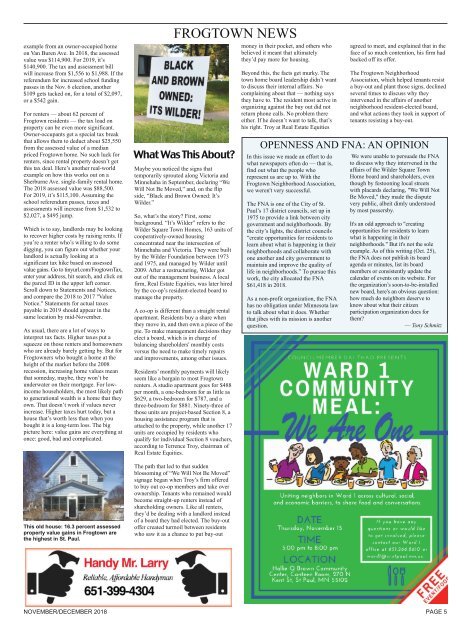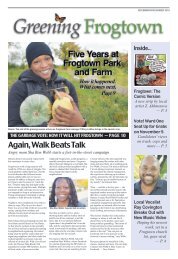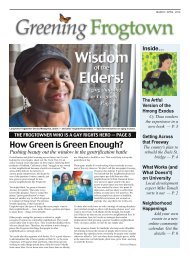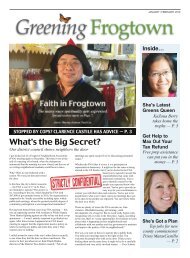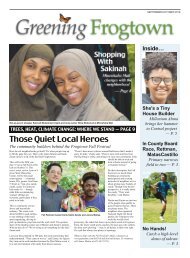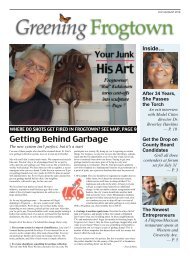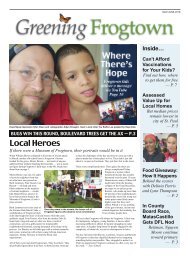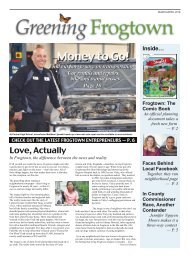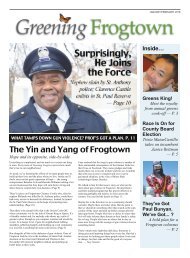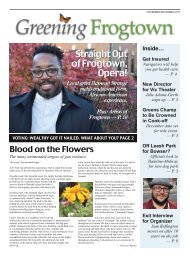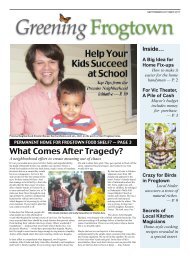GreeningFrogtownNovDec
Create successful ePaper yourself
Turn your PDF publications into a flip-book with our unique Google optimized e-Paper software.
example from an owner-occupied home<br />
on Van Buren Ave. In 201 8, the assessed<br />
value was $11 4,900. For 201 9, it’s<br />
$1 40,900. The tax and assessment bill<br />
will increase from $1 ,556 to $1 ,988. If the<br />
referendum for increased school funding<br />
passes in the Nov. 6 election, another<br />
$1 09 gets tacked on, for a total of $2,097,<br />
or a $542 gain.<br />
For renters — about 62 percent of<br />
Frogtown residents — the tax load on<br />
property can be even more significant.<br />
Owner-occupants get a special tax break<br />
that allows them to deduct about $25,550<br />
from the assessed value of a median<br />
priced Frogtown home. No such luck for<br />
renters, since rental property doesn’t get<br />
this tax deal. Here’s another real-world<br />
example on how this works out on a<br />
Sherburne Ave. single-family rental home.<br />
The 201 8 assessed value was $88,500.<br />
For 201 9, it’s $11 5,1 00. Assuming the<br />
school referendum passes, taxes and<br />
assessments will increase from $1 ,532 to<br />
$2,027, a $495 jump.<br />
Which is to say, landlords may be looking<br />
to recover higher costs by raising rents. If<br />
you’re a renter who’s willing to do some<br />
digging, you can figure out whether your<br />
landlord is actually looking at a<br />
significant tax hike based on assessed<br />
value gains. Go to tinyurl.com/FrogtownTax,<br />
enter your address, hit search, and click on<br />
the parcel ID in the upper left corner.<br />
Scroll down to Statements and Notices,<br />
and compare the 201 8 to 201 7 "Value<br />
Notice." Statements for actual taxes<br />
payable in 201 9 should appear in the<br />
same location by mid-November.<br />
As usual, there are a lot of ways to<br />
interpret tax facts. Higher taxes put a<br />
squeeze on those renters and homeowners<br />
who are already barely getting by. But for<br />
Frogtowners who bought a home at the<br />
height of the market before the 2008<br />
recession, increasing home values mean<br />
that someday, maybe, they won’t be<br />
underwater on their mortgage. For lowincome<br />
householders, the most likely path<br />
to generational wealth is a home that they<br />
own. That doesn’t work if values never<br />
increase. Higher taxes hurt today, but a<br />
house that’s worth less than when you<br />
bought it is a long-term loss. The big<br />
picture here: value gains are everything at<br />
once: good, bad and complicated.<br />
This old house: 1 6.3 percent assessed<br />
property value gains in Frogtown are<br />
the highest in St. Paul.<br />
FROGTOWN NEWS<br />
What Was This About?<br />
Maybe you noticed the signs that<br />
temporarily sprouted along Victoria and<br />
Minnehaha in September, declaring “We<br />
Will Not Be Moved,” and, on the flip<br />
side, “Black and Brown Owned: It’s<br />
Wilder.”<br />
So, what’s the story? First, some<br />
background. “It’s Wilder” refers to the<br />
Wilder Square Town Homes, 1 63 units of<br />
cooperatively-owned housing<br />
concentrated near the intersection of<br />
Minnehaha and Victoria. They were built<br />
by the Wilder Foundation between 1 973<br />
and 1 975, and managed by Wilder until<br />
2009. After a restructuring, Wilder got<br />
out of the management business. A local<br />
firm, Real Estate Equities, was later hired<br />
by the co-op’s resident-elected board to<br />
manage the property.<br />
A co-op is different than a straight rental<br />
apartment. Residents buy a share when<br />
they move in, and then own a piece of the<br />
pie. To make management decisions they<br />
elect a board, which is in charge of<br />
balancing shareholders' monthly costs<br />
versus the need to make timely repairs<br />
and improvements, among other issues.<br />
Residents’ monthly payments will likely<br />
seem like a bargain to most Frogtown<br />
renters. A studio apartment goes for $488<br />
per month, a one-bedroom for as little as<br />
$629, a two-bedroom for $787, and a<br />
three-bedroom for $881 . Ninety-three of<br />
those units are project-based Section 8, a<br />
housing assistance program that is<br />
attached to the property, while another 1 7<br />
units are occupied by residents who<br />
qualify for individual Section 8 vouchers,<br />
according to Terrence Troy, chairman of<br />
Real Estate Equities.<br />
The path that led to that sudden<br />
blossoming of “We Will Not Be Moved”<br />
signage began when Troy’s firm offered<br />
to buy out co-op members and take over<br />
ownership. Tenants who remained would<br />
become straight-up renters instead of<br />
shareholding owners. Like all renters,<br />
they’d be dealing with a landlord instead<br />
of a board they had elected. The buy-out<br />
offer created turmoil between residents<br />
who saw it as a chance to put buy-out<br />
money in their pocket, and others who<br />
believed it meant that ultimately<br />
they’d pay more for housing.<br />
Beyond this, the facts get murky. The<br />
town home board leadership didn’t want<br />
to discuss their internal affairs. No<br />
complaining about that — nothing says<br />
they have to. The resident most active in<br />
organizing against the buy out did not<br />
return phone calls. No problem there<br />
either. If he doesn’t want to talk, that’s<br />
his right. Troy at Real Estate Equities<br />
agreed to meet, and explained that in the<br />
face of so much contention, his firm had<br />
backed off its offer.<br />
The Frogtown Neighborhood<br />
Association, which helped tenants resist<br />
a buy-out and plant those signs, declined<br />
several times to discuss why they<br />
intervened in the affairs of another<br />
neighborhood resident-elected board,<br />
and what actions they took in support of<br />
tenants resisting a buy-out.<br />
OPENNESS AND FNA: AN OPINION<br />
In this issue we made an effort to do<br />
what newspapers often do — that is,<br />
find out what the people who<br />
represent us are up to. With the<br />
Frogtown Neighborhood Association,<br />
we weren't very successful.<br />
The FNA is one of the City of St.<br />
Paul’s 1 7 district councils, set up in<br />
1 975 to provide a link between city<br />
government and neighborhoods. By<br />
the city’s lights, the district councils<br />
“create opportunities for residents to<br />
learn about what is happening in their<br />
neighborhoods and collaborate with<br />
one another and city government to<br />
maintain and improve the quality of<br />
life in neighborhoods.” To pursue this<br />
work, the city allocated the FNA<br />
$61 ,41 8 in 201 8.<br />
As a non-profit organization, the FNA<br />
has no obligation under Minnesota law<br />
to talk about what it does. Whether<br />
that jibes with its mission is another<br />
question.<br />
We were unable to persuade the FNA<br />
to discuss why they intervened in the<br />
affairs of the Wilder Square Town<br />
Home board and shareholders, even<br />
though by festooning local streets<br />
with placards declaring, "We Will Not<br />
Be Moved," they made the dispute<br />
very public, albeit dimly understood<br />
by most passersby.<br />
It's an odd approach to "creating<br />
opportunities for residents to learn<br />
what is happening in their<br />
neighborhoods." But it's not the sole<br />
example. As of this writing (Oct. 25),<br />
the FNA does not publish its board<br />
agenda or minutes, list its board<br />
members or consistently update the<br />
calendar of events on its website. For<br />
the organization’s soon-to-be-installed<br />
new board, here's an obvious question:<br />
how much do neighbors deserve to<br />
know about what their citizen<br />
participation organization does for<br />
them?<br />
— Tony Schmitz<br />
NOVEMBER/DECEMBER 2018<br />
PAGE 5


